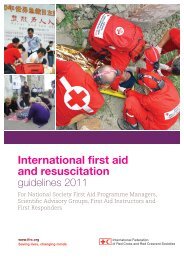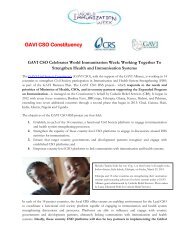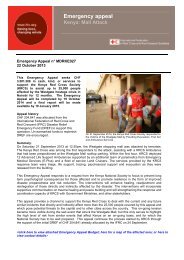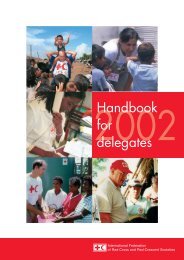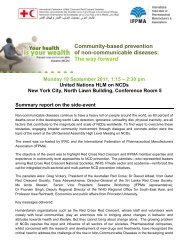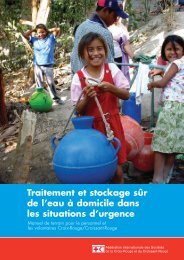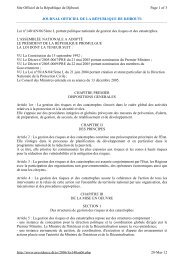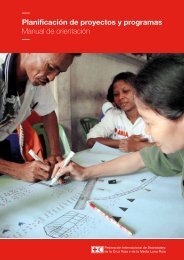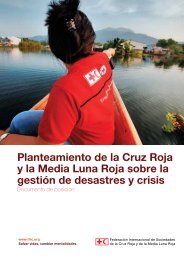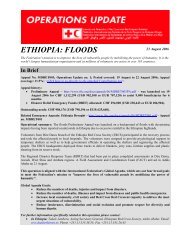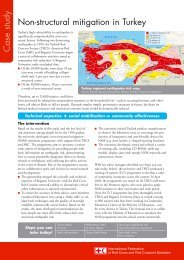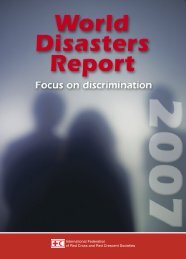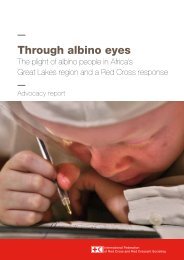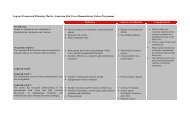World Disasters Report 2010 - International Federation of Red Cross ...
World Disasters Report 2010 - International Federation of Red Cross ...
World Disasters Report 2010 - International Federation of Red Cross ...
Create successful ePaper yourself
Turn your PDF publications into a flip-book with our unique Google optimized e-Paper software.
56<br />
After the earthquake in the Marathwada region <strong>of</strong> Maharashtra, India in 1993, two<br />
Indian NGOs with long experience in working with grass-roots associations organized<br />
meetings for affected communities in the two most-impacted districts to share<br />
their loss, grieve and also share their experiences <strong>of</strong> how they had saved many people.<br />
This was the first time that women were included in such meetings. It also allowed<br />
them to discuss what they needed and how they could become involved in rebuilding.<br />
A local NGO working with the 20,000 households displaced by a mud volcano disaster<br />
in Sidoarjo, Indonesia in 2006, noted: “Perhaps the most important support from<br />
external donors could have been on-the-ground, long-term support for those affected<br />
to develop their capacities, to agree on and put forward their solutions and then implement<br />
them. It seems that changes in donor structures and staff have actually moved<br />
many donors further away from such an approach.”<br />
Box 3.1 describes the experiences <strong>of</strong> the Philippines Homeless People’s <strong>Federation</strong> in<br />
community-driven responses to five disasters between 2000 and 2008. The federation<br />
is a national network <strong>of</strong> 161 urban poor community associations and savings groups<br />
with more than 70,000 individual members from 18 cities and 15 municipalities.<br />
Members promote community savings in order to build their own financial capacities<br />
and to promote community development and social cohesion.<br />
Box 3.1 The Philippines Homeless People’s <strong>Federation</strong>’s role<br />
in community-driven disaster response<br />
The Philippines’ location within the circum-<br />
Pacific seismic belt means that the country is<br />
regularly affected by earthquakes, volcanic<br />
eruptions, typhoons, storm surges, landslides,<br />
floods and droughts. The link between vulnerability,<br />
and disaster and poverty is strong –<br />
many low-income groups live in high-risk sites<br />
and have poor-quality housing. They also have<br />
less protective infrastructure and fewer resources<br />
to call on after being impacted by disasters.<br />
The Philippines Homeless People’s<br />
<strong>Federation</strong> (HPF) is a national network <strong>of</strong> urban<br />
poor community associations and savings<br />
groups that are engaged in many initiatives<br />
to secure land tenure, build or improve homes<br />
and increase economic opportunity, working<br />
wherever possible in partnership with local<br />
governments. The five disasters listed in the<br />
table below encouraged the HPF to develop<br />
its own policies and practices first for disaster<br />
response, and later for disaster risk reduction.<br />
The HPF was already active in Payatas<br />
when the trash slide happened and had been<br />
implementing a mix <strong>of</strong> community-based development<br />
programmes (savings and loan<br />
schemes, secure tenure initiatives) and welfare<br />
programmes (for the elderly, health, childcare<br />
and rehabilitation <strong>of</strong> children with disabilities)<br />
with support from the Vincentian Missionaries<br />
Social Development Foundation Inc. However,<br />
it recognized its lack <strong>of</strong> knowledge and skills<br />
in how to address disasters.<br />
The HPF’s response to these disasters was<br />
to work with the survivors, helping them to<br />
organize and to influence reconstruction. For<br />
instance, in Barangay Guinsaugon, after the<br />
landslide, they worked with survivors, helping<br />
them to organize (including a survey covering



